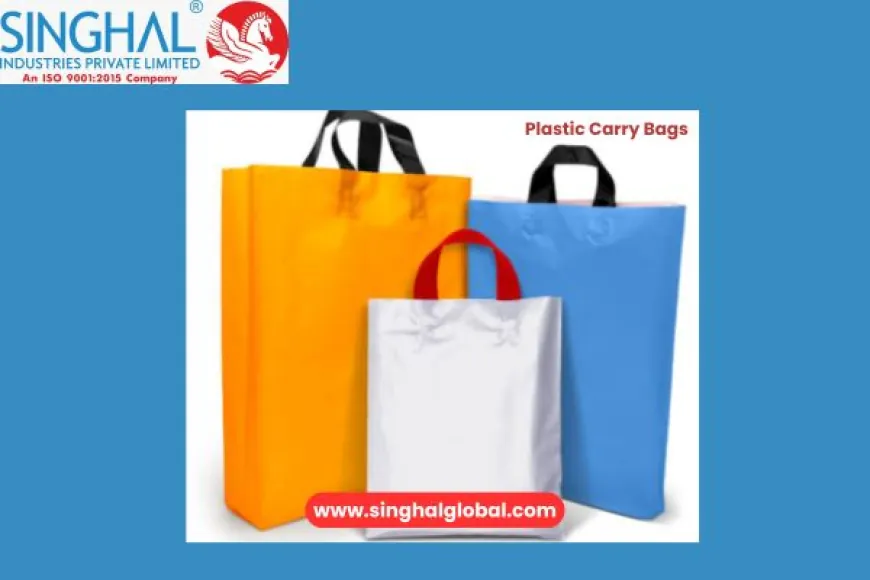The Impact of Shopping Plastic Bags on the Environment and Alternatives
This article delves into the impact of shopping plastic bags, particularly polythene carry bags, on the environment. It examines the role of carrier bag manufacturers in addressing plastic pollution and explores sustainable alternatives that consumers can adopt. Discover the urgent need for change in our shopping habits and the benefits of making environmentally friendly choices.
In today’s fast-paced consumer culture, Shopping Plastic Bags have become a common sight in retail outlets around the world. These convenient carriers, often made from Polythene Carry Bags, provide an easy way for consumers to transport their purchases. However, the widespread use of these bags has raised significant concerns regarding their environmental impact. As awareness grows, it is crucial to explore the implications of Shopping Plastic Bags, the role of Carrier Bag Manufacturers, and viable alternatives for a sustainable future.
The Ubiquity of Shopping Plastic Bags
Shopping Plastic Bags are designed for convenience and are typically lightweight, durable, and inexpensive. Retailers often provide these bags to customers free of charge or at a nominal fee, promoting their use as a standard practice. The ease of carrying groceries, clothing, and other purchases makes Polythene Carry Bags a popular choice among consumers. However, this convenience comes at a considerable environmental cost.
Environmental Concerns
One of the most pressing issues with Shopping Plastic Bags is their contribution to plastic pollution. According to studies, millions of plastic bags are used every year, with a significant portion ending up in landfills, oceans, and other natural environments. Once discarded, these bags can take hundreds of years to decompose, leading to long-term environmental damage.
Plastic pollution poses serious threats to wildlife, as animals often ingest plastic or become entangled in it. This not only affects individual species but also disrupts entire ecosystems. The alarming rate at which Polythene Carry Bags are consumed necessitates urgent action to mitigate their effects on the environment.
The Role of Carrier Bag Manufacturers
Carrier Bag Manufacturers play a crucial role in the plastic bag supply chain. As demand for Shopping Plastic Bags remains high, these manufacturers must navigate the balance between meeting consumer needs and addressing environmental concerns. Some manufacturers are taking proactive steps to develop more sustainable options, such as biodegradable or recyclable bags.
However, the transition to eco-friendly alternatives requires significant investment in research and development. Many manufacturers are also exploring the use of recycled materials to produce Polythene Carry Bags, thereby reducing the reliance on virgin plastic. By adopting more sustainable practices, Carrier Bag Manufacturers can contribute to a reduction in plastic waste and promote environmental stewardship.

Sustainable Alternatives
To combat the environmental impact of Shopping Plastic Bags, consumers and retailers alike can consider several sustainable alternatives:
-
Reusable Bags: One of the most effective ways to reduce plastic waste is to encourage the use of reusable bags. Made from durable materials such as cotton, jute, or recycled plastic, these bags can be used multiple times and significantly decrease the need for single-use plastic bags.
-
Biodegradable Bags: Some manufacturers are now producing biodegradable options that break down more quickly than traditional plastic. These bags are designed to decompose in a composting environment, reducing their environmental footprint.
-
Paper Bags: While not without their own environmental concerns, paper bags can be a more sustainable option when sourced from recycled materials. They are biodegradable and can be recycled multiple times, provided consumers dispose of them responsibly.
-
Bulk Shopping: Encouraging consumers to buy in bulk can also help reduce the need for Polythene Carry Bags. By using their own containers, shoppers can minimize waste and make more environmentally friendly choices.
Conclusion
The prevalence of Shopping Plastic Bags in our daily lives has undeniable convenience, but the environmental implications are too significant to ignore. It is essential for both consumers and Carrier Bag Manufacturers to embrace sustainable practices that can mitigate the detrimental effects of plastic pollution. By prioritizing reusable, biodegradable, and recyclable options, we can work towards a future where the negative impact of Polythene Carry Bags is significantly reduced. Together, we have the power to create a cleaner, greener planet for generations to come.
FAQs about Shopping Plastic Bags
1. What are Shopping Plastic Bags?
Shopping Plastic Bags are lightweight, disposable bags typically made from polyethylene, designed for carrying goods purchased from retail outlets. They are commonly used in grocery stores, clothing shops, and various other retailers.
2. What are Polythene Carry Bags?
Polythene Carry Bags are a type of plastic bag made from polyethylene. They are popular for their durability and flexibility, making them ideal for carrying various products. However, their environmental impact is a growing concern.
3. Why are Shopping Plastic Bags harmful to the environment?
Shopping Plastic Bags contribute significantly to plastic pollution. They can take hundreds of years to decompose, leading to long-term environmental damage. When improperly disposed of, they can harm wildlife and ecosystems, as animals may ingest or become entangled in plastic.
What's Your Reaction?
 Like
0
Like
0
 Dislike
0
Dislike
0
 Love
0
Love
0
 Funny
0
Funny
0
 Angry
0
Angry
0
 Sad
0
Sad
0
 Wow
0
Wow
0


















































